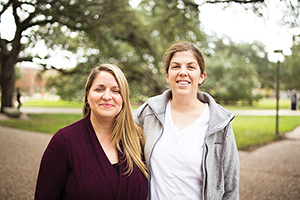Aggies on the spectrum (TX UCEDD)
February 4, 2016

|
A new student organization is paving the way for students with autism to have their voices represented on campus.
Several Texas A&M students and Aimee Day, program coordinator for the Center on Disability and Development, have teamed up to form a student organization for adults with autism. The group hopes the organization will one day be run by students with autism as a way to give them an organization where they can both make connections and learn leadership lessons.
"About four years ago, I contacted Texas A&M University to see if they had a student organization for adults on the [autism] spectrum," Day said. "Unfortunately, they did not have one. After I began working at the Center on Disability and Development, I realized I was in a position to help the students create the organization."
The organization will provide support for students by arranging opportunities to socialize, organizing events to create awareness, and forming a mentor program with other autistic students.
Day said the new group will allow students with autism to run their own organization and focus on the programs and services they find most important.
"There are organizations at many universities that raise autism awareness or offer social opportunities, but not many are led by students with autism," Day said. "Giving them the ability to have ownership of the group is paramount."
Whitney Gilliland, a fourth-year student in the special education doctoral program at Texas A&M who has Asperger's syndrome, said college students with autism face a wide range of hardships. These difficulties can include trouble reading and exhibiting nonverbal cues such as facial expression, tone of voice and body language.
"We tend to take some things very literally if not given proper social training," Gilliland said. "Additionally, anything outside of routine or what we are used to can be very difficult. Without someone there who has had similar experiences, college can be a very difficult place."
Christopher Mathey, a graduate lecturer in the Department of Sociology, said he hopes the organization will also influence students who are unwilling to interact with autistic people.
"It's a matter of getting past that veil," Mathey said. "We need to be able to transcend that so we can be able to understand that there's a whole lot more to the autistic spectrum that the Texas A&M community might not necessarily realize."
Gilliland said her personal connection with autism helped her push for the organization.
"I grew up with a learning disorder but was diagnosed with Asperger's syndrome when I was 26 years old," Gilliland said. "I went to college with this disorder, so I experienced a lot of what these individuals are experiencing on a very personal level."
Day said her son with autism experiences similar hardships.
"As a parent of a sweet and smart son with autism, I know that friendships do not come easy for him," Day said. "I hope that this group will provide a welcoming environment and give students an opportunity to meet other students on the spectrum. I'd also like to see autistic professionals come speak to the group and share their stories of success and challenges they've overcome at work and school."
Although the organization will provide direct benefits to students on the autism spectrum, Day said every student at Texas A&M will have the opportunity to join, giving all Aggies a chance to learn and grow as a result of this group.
"They can help the organization move beyond autism awareness," Day said. "Just like any other organization, the students can learn from each other's experiences. They can teach each other self-advocacy, success in school, at work or even in relationships."
Mathey said while there isn't an agreed upon name for the organization yet, some possibilities include ‘Autistic Aggies,' and ‘Aggies on the Spectrum.' Day said the goals of the organization will be left up to its student leaders, she trusts the group will provide more opportunities for autistic adults.
"[My personal goal is] for the organization to be successful in providing support for students on the spectrum, help build friendships, teach self-advocacy and promote neurodiversity," Day said.
Students interested in the organization may email Day at [email protected]
Article written by Ashley Wagner, The Battalion - View Full Article







